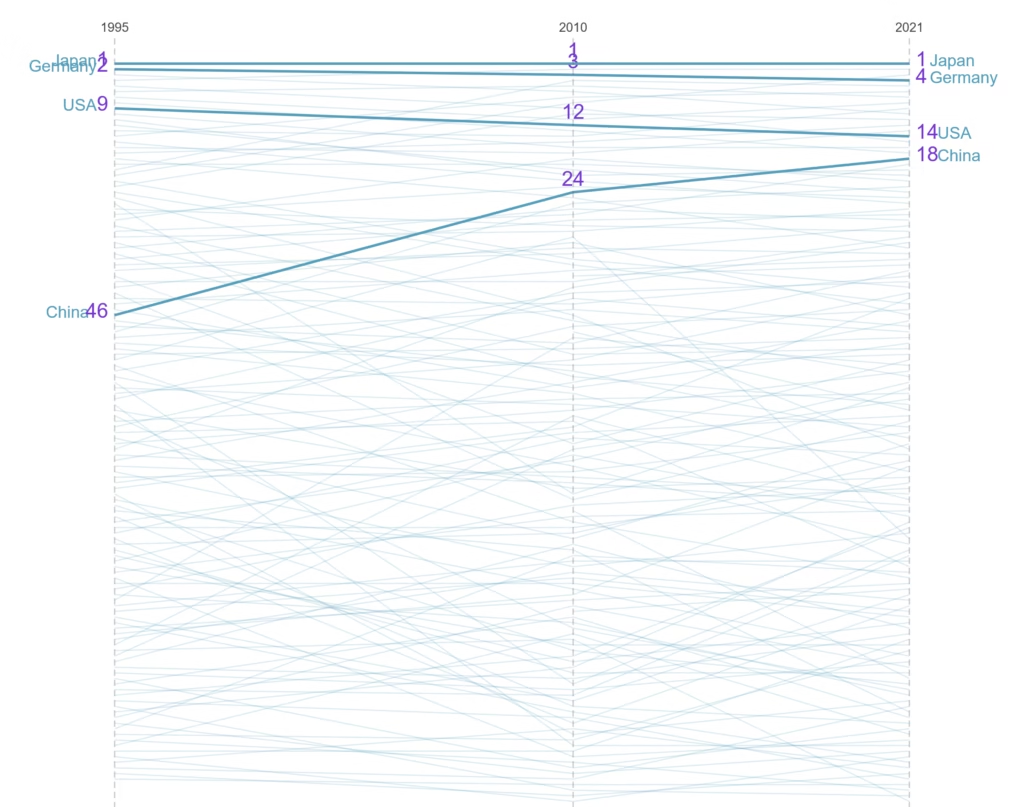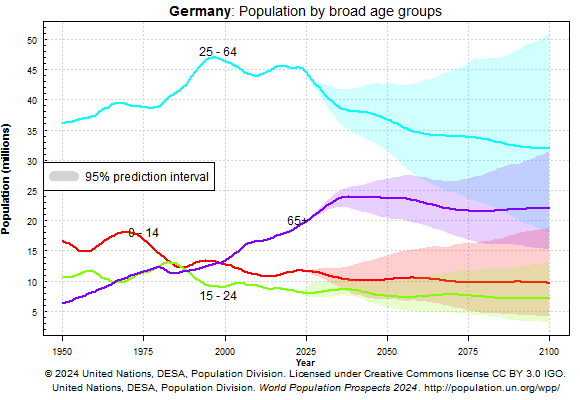I believe that recent allegations of an ailing German economy are overblown to fabricate fear and attention. The political cycle with its incentives does the rest. My main points to keep calm are Resilience, global Fragmentation, a functioning political system, manageable demographics, and the transitory timespan of the problems. But I am cautious about political uncertainty around Trump and China, for Germany’s exposure to two of its most important trading partners is high.
Germany’s industry is resilient
A German state is a young one compared to other nationalities like England, France, or the Netherlands. But since its founding in 1871, Bismarck’s creation is the industrial Powerhouse of Europe.
It survived two world wars, total destruction, the Cold War division, and the stagnation of the early 2000s.
Why should this time be different?
The German Economy can still rely on World-class infrastructure and excellent human capital. It has access to integrated markets in Western and Eastern Europe, so it can focus on value-added production. Even a dominant position inside the EU helps by allowing the wider system to absorb shocks.
Even if a single shock strikes, the highly diversified nature of the German economy assures a general stability — Germany still forms part of the leading group in economic complexity.

Another consistent pain point is the lack of skilled workers (Fachkräftemangel). Due to labor shortages, German firms produce below their short-term potential. What is a drag in good times also buffers against unemployment when less productive firms close shop in bad times. Add some higher wages paid to the equation, and you find anxiety (in Eastern Germany) but no economic hardship. The other side of the coin is the next point of crititicism, the lack of innovation. As you have seen above, Germany still leads close to the technological frontier, where further progress is hardest, especially compared to technological transfer like the Chinese. It is true that the number of startups more than halved since 2003, but that is the consequence of the good availability of high paying high quality secure jobs due to Fachkräftemangel.
Profit from global fragmentation
If you are a highly complex economy integrated into the global trade network, fragmentation of the same bears many risks and downsides to navigate. But Germany has an opportunity. Many efficiency gains come from better utilization of available capital. By putting up artificial barriers, the needed machinery is going to increase, opening new demand for German engineers to fill. Vietnam, India, and maybe parts of Africa require machines to industrialize and Germany can supply. But what about Chinese manufacturing, you may ask. Fragmentation, which lowers Chinese demand also prevents them from providing machinery.
Working Democracy and civil society
Well, using opportunities requires strategic leadership, and political stability would also help. Olaf Scholz is currently gambling for resurrection as he is deeply unpopular and new elections are due for February. That may look like incompetence and instability on the surface, but the process is orderly and fulfills the transition of power if the government is not well aligned with the popular will. Many are less than amused or even anxious. Even then, there is no civil unrest and trust in the democratic institutions remains high.
Manageable demographics

The lack of unrest may be due to the old populace, which depends on transfers and care.
Once the steep decline in working age population due to the baby boom of the 1960s and 1970s wears off, Germany has relatively stable demographics, especially compared to China, Italy, or Iran.
The current amelioration consists of immigration. This brings with it large uncertainty with regard to the political will and ability to integrate the immigrants into the German society.
The resources necessary for that are available with Germany having exceptionally low debt on the books if you do not count implicit European obligations and unfunded pensions.
Problems are transitory
The last reason for optimism is the rather temporary nature of some problems. For example, the high fraction of energy intensive manufacturing in German GDP exposes the economy to supply shocks in Russian gas. On the demand side, Germany fabricates durable goods with stable preferences, which were in high demand during the 2020 global pandemic and currently normalize.
Conclusion
There are long term and serious issues in the German economy, but it is hard to do better. Germans like to complain, and most of the time it is not as serious as it might sound. However, the dependence on cheap energy and global integration leave concerns that are barely within German control and cannot be solved by good fundamentals like human capital and infrastructure alone. Instead, they require careful diplomacy and good governance.



